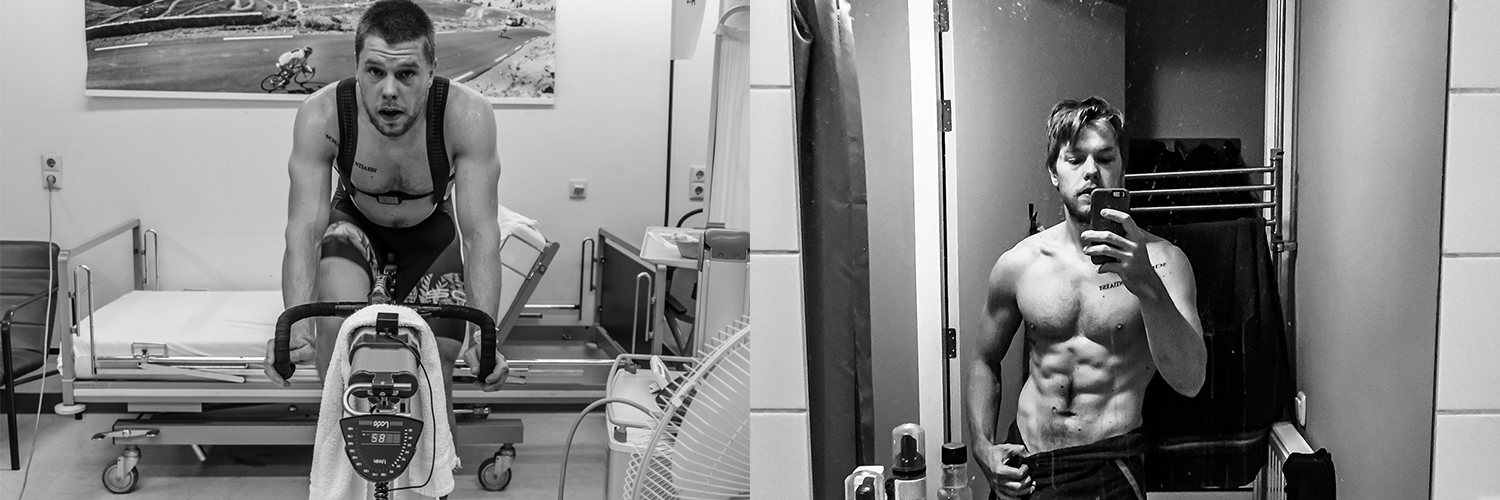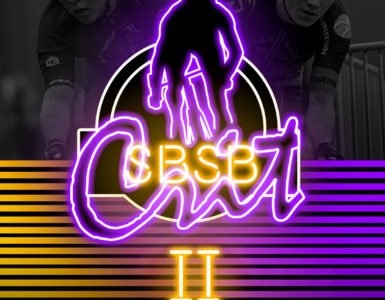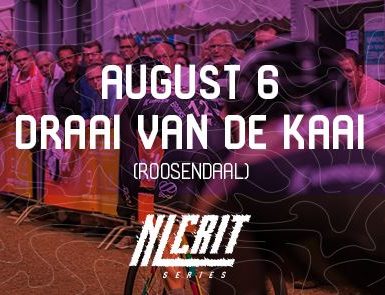In the recently published article we asked our sports-nutritionist Cas Fuchs why and how weight can best be lost in the off-season for cyclists. As on paper everything it might look super easy, I will test it out myself as part of the project ‘Get Brian Back in Shape.’ Currently, I am 2 months in my weight loss process and through my experiences I hope to help other people that aim to lose a bit weight and would like to have more info than only the scientific facts.
Long story short, after my ‘pro’ cycling career I didn’t touch a bike for almost 4 years and I went from a skinny climber to a bulky gym goer. I can’t complain about my first full season in the fixed gear crit scene but I always felt that I could do better if I got my weight and training regime sorted. Together with the aim of FGC to help riders with their nutrition and training the series ‘Get Brian Back in Shape’ was born. In this series topics like training, nutrition, and material are touched upon in order to get you sorted for the upcoming fixed gear crit season!
Text: Brian Megens
Before the 2017 season: 82.5kg
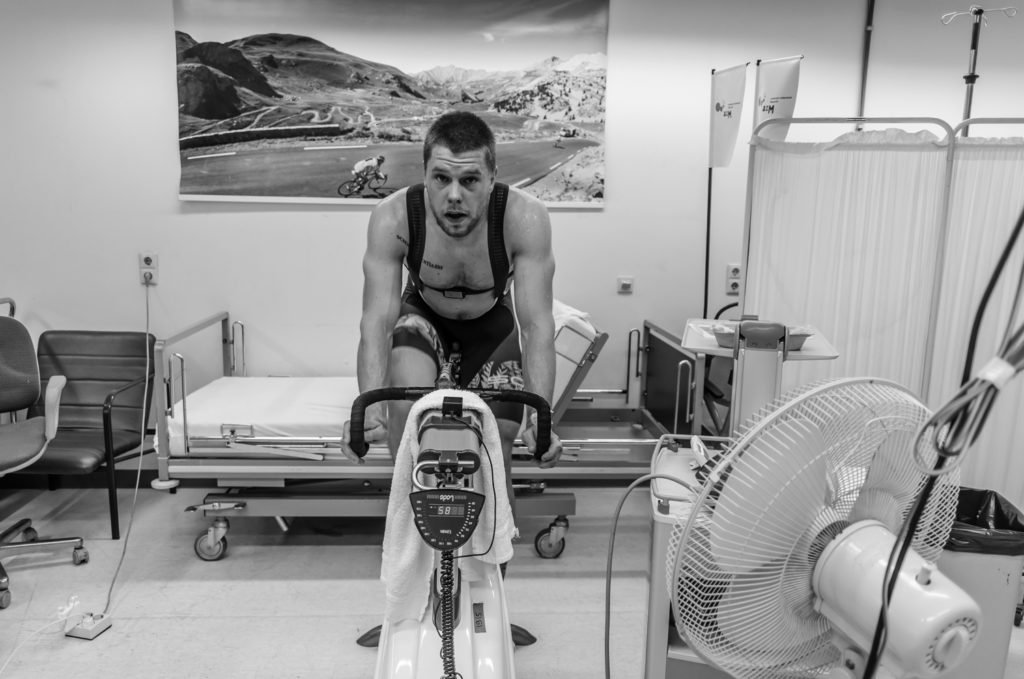
6 weeks in my weight loss project: 79kg
I started with a fat percentage of around 13%, which is relatively low but theoretically dropping it down to 8% is doable. However, my biggest issue is that, according to my trainer Raphael Jung, I am ‘’a muscle machine.” So my years in gym gave me a upper-body which works great on Tinder, Happn, and in the club but it’s not ideal for bike racing. I started off with a weight of 82.5-83kg. Currently I am around 78.5 kg and my aim is 75kg. So far things are going really well and with the guidance of Cas I am confident that my weight goals will be reached. Here are my 5 tips that can help you in achieving your weight goals:
1. Keep track of what you eat in an excel sheet and calculate the calories
I always thought that I had a very healthy eating pattern. Nevertheless, when I summed up everything in Excel I could see that I still had quite some room for improvement. For example, I normally eat a yoghurt just before going to bed. The yoghurt is high in protein and low in calories, but overtime I started adding cruesli. This started with low portions but overtime the Cruesli was probably higher in calories than the yoghurt itself. On top of that, cruesli is super high in refined sugars, something you really don’t need just before going to bed. besides, by keeping track of what you eat you also become aware of the little snacks that you normally forget about, and all together they are responsible for quite a share in your daily energy intake. My food diary really gave a good overview of what I should change. If you want to be super precise you can even weigh your food. I decided not to do this although my sports-nutritionist Cas Fuchs did advice me to do so.
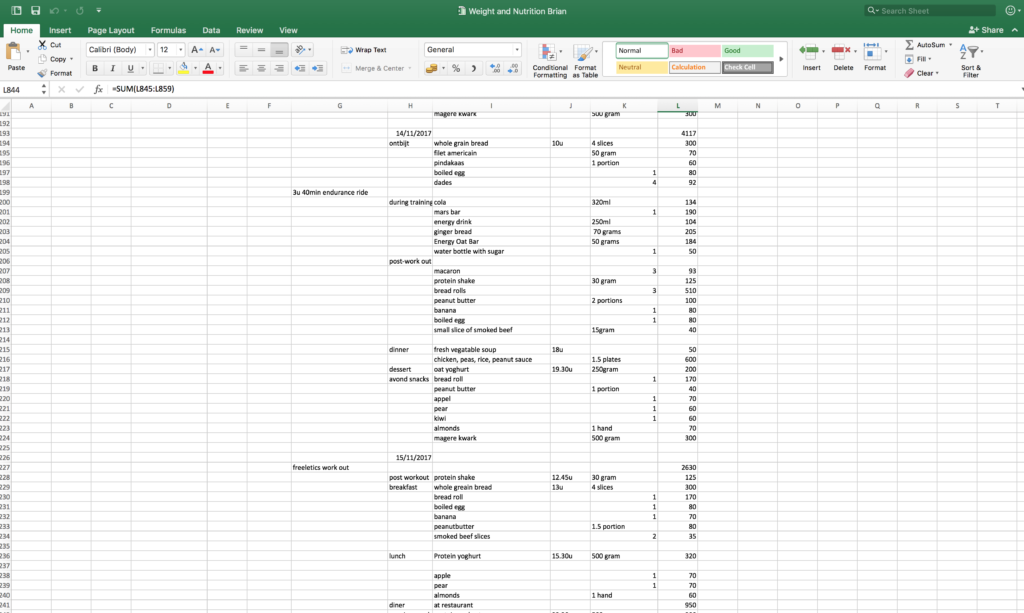
2. Do not starve yourself
The excel sheet is a great start. However, it is also tricky because it can be the start of a competition to the bottom wherein you end up cutting more and more calories every day. Therefore, do not starve yourself, there is one thing way worse than carrying too much weight and that is a lack of energy. If you crash too hard, your body will consume its muscles as energy source and you will lose weight, but you will lose more power resulting that in the end of the day your performance will be less.
3. Do what works for you
There is no magical formula for weight loss. In theory it is simple, create a calorie deficiency of around 500 every day which means that you should lose around 1kg every 2-3 weeks. But how you do that is up to you. For me intermitting fastening seems to work. This basically means that I have my first meal around noon and I have an eating window of around 8-9 hours. Please note that this can work for you but I do not advice it to people that start their day early or do heavy physical exercise in the morning. In short, it is not one fits all. For some eating less with dinner works. This is something that doesn’t work for me as I really need that 1 time per day in which I can eat an amount which I judge to be sufficient which is normally around 800-1000 calories. For most this is a huge dinner but for me this is moderate as I got used to eating 5000+ calories a day when I was a road cyclist training 20-30 hours per week. Therefore, to achieve my calorie goals I often skip breakfast.
4. It is a mental game
For me, losing weight is a mental game. I will probably struggle with my weight for the rest of my life and because I got used to eating a lot as a cyclist the occasions that I feel stuffed are limited to all-you can eat buffets. This may sound weird, but I am at peace with it. As a kid I became overweight after I had to give up on football due to an injury. I then went from 91kg (mainly in fat) to 70kg (and later 65kg) by starting to exercise and reading into nutrition and obviously improving my diet. However, as a ‘pro’ cyclist I took it a step too far. I became too skinny and my body started to go in ‘survival’ mode which basically meant the end for my pro road ambitions. A new chapter in my weight fluctuations is getting in race weight shape for fixed gear crits. I don’t see it as a negative thing but another challenge, a mental game. A game wherein you can go for short-term benefits, eating that chocolate, or long-term benefits, resisting that chocolate.
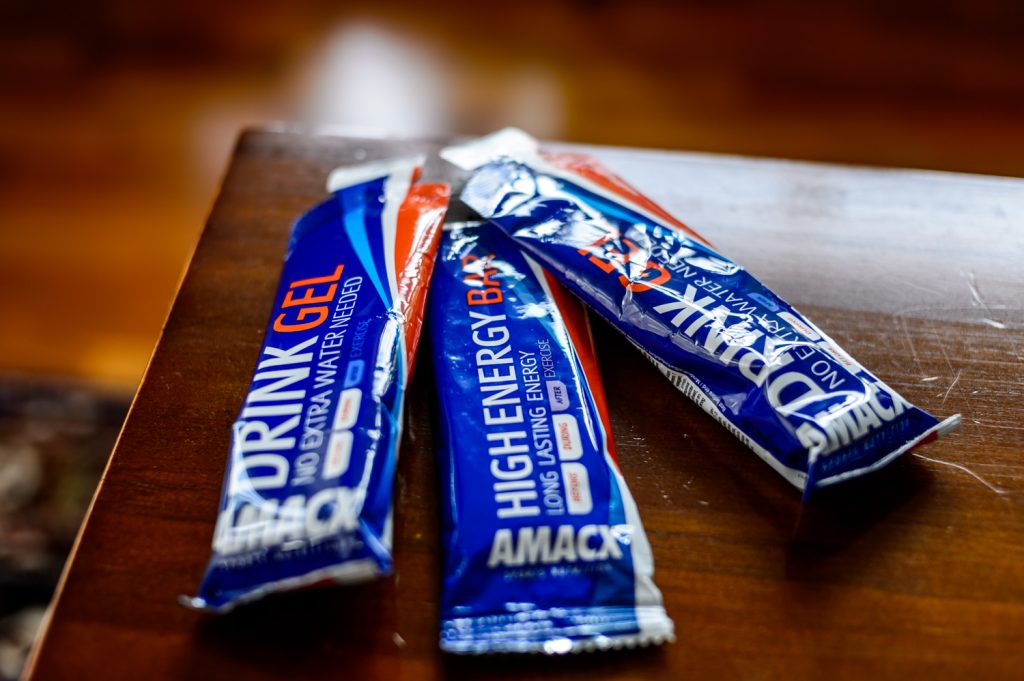
5. Make a nutrition plan that is sustainable for you
Cutting every ‘bad’ type of food out of your diet might sound good and will work great in the short-term, in the long-term however it will probably backfire on you. Therefore, the best option most of the times is to keep some ‘cheating’ moments. If you plan those wisely it probably doesn’t affect your weight loss at all. For example, on long endurance rides I always bring a Mars bar which probably is a bit less healthy than other energy bars, although it is better than muesli bars people please stop eating those their saturated fat level is huge, but because I use so much energy on a 4hr ride my body actually needs the energy. Another example is that I really like the (fresh) shakes at my local Vietnamese restaurant and despite that they contain fresh fruit, they probably aren’t very healthy due to whole milk but I see this as my ‘cheat’ and having this every now and then makes given up on other foods bearable.
Good luck and if you have any questions do not hesitate in contacting me via Instagram!

